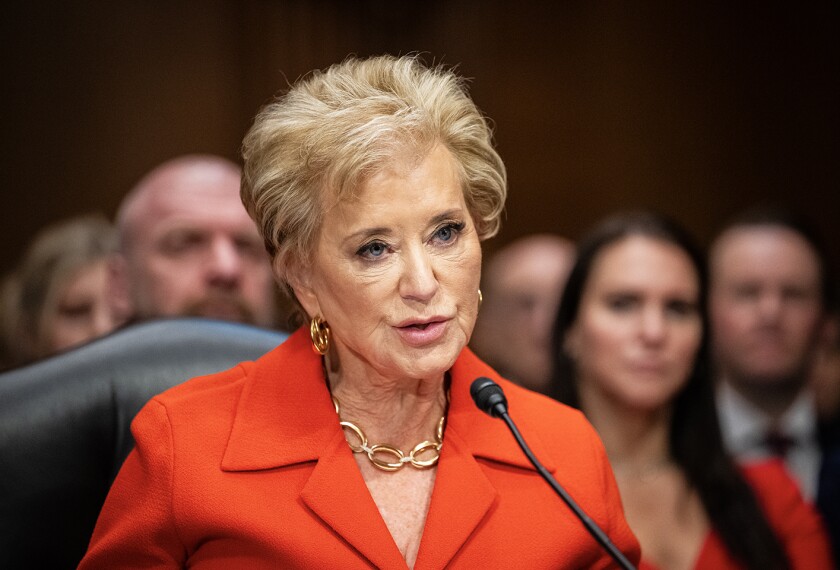John P. Higgins Jr. retired as the Department of Education’s inspector general July 1 after working 40 years in various roles as a watchdog over federal education programs, but the office he led for the past six years continues turning out reports without him.
Since Mr. Higgins left his post, the inspector general’s office has issued important reports alleging that the Detroit school district has misspent almost $1.4 million in federal Title I money—and failed to properly document $52.2 million in other spending—in the 2004-05 and 2005-06 school years; calling for a grant recipient for a dropout-prevention program to return $1.5 million; and documenting that Education Department officials failed to adequately oversee employees’ travel expenses.
None of the audit reports drew the headlines that some inspector general reports from the department have—such as investigations into how Bush administration officials approved materials for use in the Reading First program and Education Department employees’ financial conflicts of interest in managing student-loan programs.
But the recent reports continue a trend in which the department’s watchdog has been increasingly aggressive in tracking problems in federal K-12 programs, Mr. Higgins, 62, said in an telephone interview from his suburban-Washington home last week.
Until 1980, when federal education programs were managed by what was then the Department of Health, Education, and Welfare, about 75 percent of education investigations centered on the department’s student-loan and financial-aid programs, he said. Now, the Education Department’s office of inspector general—commonly known as the IG’s office—dedicates half its time to problems in K-12 programs, Mr. Higgins said.
Several of those investigations turned up evidence of criminal wrongdoing.
In 2006, after an investigation by the IG’s office, former Georgia state schools Superintendent Linda C. Schrenko pleaded guilty to spending federal education money on her 2002 gubernatorial campaign and for personal expenses—including the cost of a face-lift. In 2006, Ms. Schrenko was sentenced to eight years in prison and ordered to pay $165,000 in restitution.
“We’ve definitely have had more criminal cases in the past 10 years than we used to,” Mr. Higgins said. “I don’t know if it got worse. I think we became more aware of it.”
Other investigations of districts have found inadequate accounting of how federal money has been spent, such as the audit of the Detroit public schools, which was released July 18.
Auditors reported that the district spent more than $1 million on salaries and other personnel costs that weren’t related to the Title I program, which serves disadvantaged students. The district also spent $348,000 on capital expenses and other services that weren’t related to the Title I program.
In an official response from the Michigan Department of Education and the Detroit district, officials called the audit “seriously flawed,” saying auditors hadn’t reviewed all of the district’s documentation and didn’t consider that Title I offers financial flexibility to districts with large numbers of disadvantaged students.
Mr. Higgins said the IG’s office has found similar problems in audits of districts serving Los Angeles, Elizabeth, N.J., and other cities in recent years.
The inspector general’s office has been more aggressive in its audits of states and districts in the past decade, said Richard M. Long, the executive director of the National Association of State Title I Directors, in Washington. But the office also has been more consistent in its audits and clearer about what it wants to see, Mr. Long said.
“My members are telling me there’s a level of professionalism that they appreciate,” he said.
Improvement at Ed. Dept.
Mr. Higgins said that the inspector general’s office has been instrumental in ensuring that the Education Department improved the security of its data. Because the department stores applications for financial aid for millions of college students, their personal information would be at risk if it were vulnerable to hackers into the department’s computers.
“If it were not for us constantly reporting on computer problems to the department,” Mr. Higgins said, “I don’t think the department would have made as much progress in the past six years.”
Mary Mitchelson, the office’s deputy inspector general, is serving as acting chief. President Bush will nominate a successor to Mr. Higgins, said Samara Yudof, the department’s press secretary. The appointment is subject to Senate confirmation, but the Inspector General Act limits the president’s power to remove an inspector general once in office, unlike many other presidential appointees.






